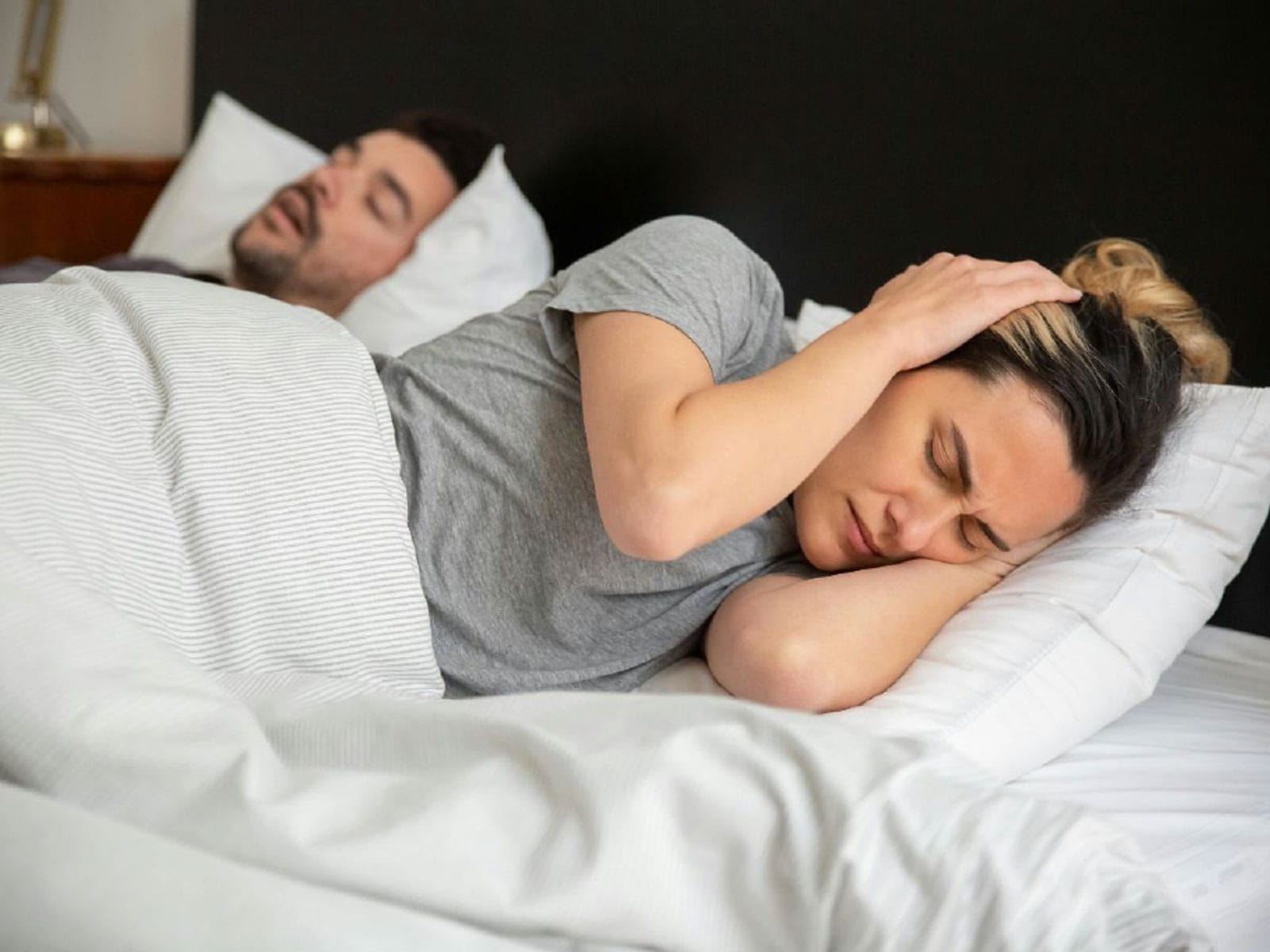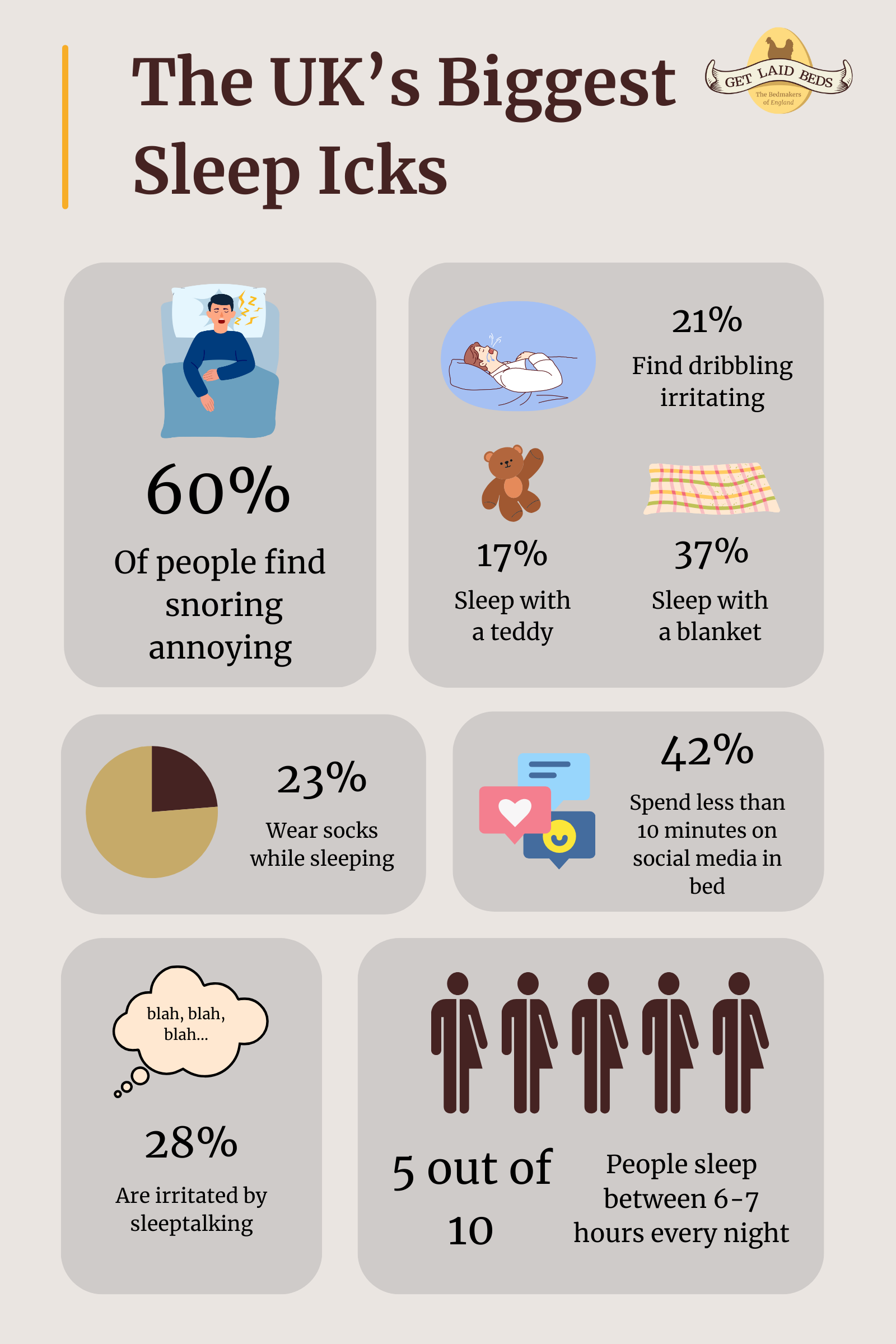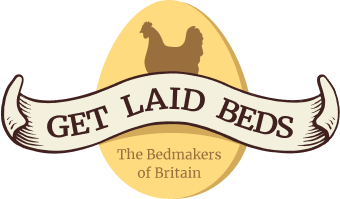
Whether we like it or not, we all do something odd in our sleep. It could be sleep
talking, walking, or the dreaded snore. But, which of these oddities annoy us the
most? And which are we most likely to do?
To find out, we’ve created a definitive list of the most embarrassing sleeping habits
(or “icks”, if you’re trendy) that you may have experienced. We then asked which of
these habits were most annoying to over 1,300 respondents and collated the data,
here.
Maybe you’re trying to give a partner a subtle hint or you’re on a self-improvement
adventure – whatever your reasons, you can find out which sleeping habits annoy us the most in this article.

Relationship experts across the globe will tell you that sleeping after an argument is something that you should never do. Doing so prevents the issue from being
resolved, which leads to resentment and a harder time dealing with conflict in the
future.
Despite all of this advice, us Brits appear to be quite reluctant to resolve conflict
before bedtime. 73.22% of UK residents claimed to have gone to sleep after an
unresolved argument with a friend, partner, or family member.
Sleep duration is a hot topic in the world of slumber. With there being so many
different types of sleeping patterns from polyphasic to biphasic, and everything in
between, nobody can quite agree on the right amount of hours needed for a
successful night’s sleep, every time.
How much sleep you get can fluctuate on a multitude of circumstances, but there’s
one thing we can mostly agree on: the average sits somewhere in the 6-7 hours
mark. 56.1% of respondents claimed to sleep 6-7 hours, while 26.5% claimed to
sleep 8-9 hours.
We also saw a significant portion of respondents claiming to get over 10 hours: 2.4% of them, in fact.
How much time do you spend scrolling on social media? Over the years, with the
popularity of social media ever rising, people’s screen times have increased
substantially.
In the daytime, sources report that UK device users spend around 2 hours 52
minutes on their phones. According to our survey, however, this time seldom creeps into the bedroom.
Most of our respondents (42.6%) claimed to use social media for less than 10
minutes before getting into bed. 20.9% said they spent 11-30 minutes, and 17% said between 31 minutes to one whole hour.
It appears, that social media has less of a stronghold over our nighttime routines as we might think.
We all sleep differently. Everyone has their own unique ritual they follow – from
wearing socks to sleeping with a blanket, none of us are really the same. Here are
some of the most common behaviours the UK partakes in at nighttime:
● 82.3% sleep with a teddy
● 37.5% of people still sleep with a comfort blanket
● 36% of people sleep naked
● 24% wear smart watches to bed
● 23.7% sleep with socks on
When sleeping next to someone else, there’re a lot of things we tolerate. Some light
snoring, the occasional hypnic jerk, and perhaps even sleepwalking can all be dealt
with. But, there are some things that are simply unforgivable.
In our questionnaire, we asked: out of dribbling, snoring, fidgeting, and sleep talking, which is the most irritating? The findings show a unanimous agreement that snoring is the most irritating, followed by sleepwalking, fidgeting, and then dribbling.
If you’re finding yourself falling into some of these irritating categories, you might be interested in fighting back.
To help us with this campaign, we teamed up with Charli Davies from Snuzzze to
provide some extra insight.
Preventing Snoring
“It doesn’t surprise me that snoring is at the top of the ick list. It’s the bane of millions of people’s lives and the cause of less than decent sleep. Why so many people snore and the cause of some of the other icks, in my opinion, are down to our overall lifestyle from what we eat to the amount of alcohol we drink.
So, there you have it. Some lifestyle changes may be all that you need to fight back against the most annoying sleep behaviour: snoring. For more advice, check out our article: Silence the Snore: Top Tips for Stop Snoring Week
Stopping Dribbling
Thankfully, preventing dribbling is done in much the same way as snoring. Dribbling is usually caused by breathing through the mouth rather than the nose.
People commonly do this due to trouble breathing through their nose, so we
recommend trying out a bunch of different sleeping positions to see which one helps the most.
Dust is another thing to watch out for – increased levels of dust in the bedroom can make it harder to breathe through the nose – leading to mouth breathing and,
subsequently, dribbling.
Try giving your bedroom a good clean by wiping down surfaces with a damp cloth to capture as much dust as possible. If after all this you’re still finding yourself dribbling, we recommend reaching out to a medical professional for further advice.
Stay tuned to the Get Laid Beds blog for more data-led stories such as this. Here,
you can find hints and tricks for dealing with your sleep issues, as well as help
choosing your next comfy wooden bed frame.

WE VALUE YOUR PRIVACY
We use cookies to enhance your browsing experience, serve personalised ads or content, and analyse the traffic with 3rd party services. By clicking ‘Accept’, you consent to our use of cookies, visit our Privacy Policy and our Cookie Policy for more info.
Please select one of the delivery countries below or navigate to our UK website for UK delivery options.
Note: International shipping prices are charged per bed rather than per order. This is due to the bulky nature and weight of these products.